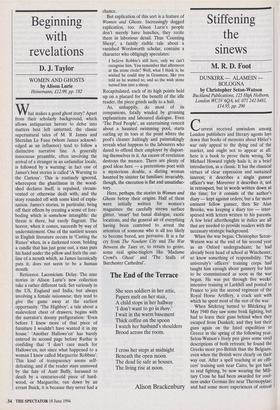Beginning with revelations
D. Jr. Taylor WOMEN AND GHOSTS by Alison Lurie Heinemann, £1299, pp. 182
hat makes a good ghost story? Apart from their scholarly background, which allows antiquarian heroes to delve into matters best left unturned, the classic supernatural tales of M. R James and Sheridan Le Fanu (whom James acknowl- edged as an influence) tend to follow a distinctive narrative line. A generally innocuous preamble, often involving the arrival of a stranger in an unfamiliar locale, is followed by a warning: in fact one of James's best stories is called 'A Warning to the Curious'. This is routinely ignored, whereupon the ghastliness in the wood- shed declares itself, is repulsed, circum- vented or otherwise dealt with, and the story rounded off with some kind of expla- nation. James's stories, in particular, bring off their effects by creating a sense of fore- boding which is somehow intangible: the threat is there, but rarely flagrant. The horror, when it comes, succeeds by way of understatement. One of the nastiest scenes in English literature occurs in 'Casting the Runes' when, in a darkened room, holding a candle that has just gone out, a man puts his hand under the pillow and feels the out- line of a mouth which, as James laconically puts it, does not seem to be a human mouth.
Reticence. Laconicism. Delay. The nine stories in Alison Lurie's new collection take a rather different tack. Set variously in the US, England and India, but always involving a female raisonneur, they tend to give the game away at the earliest opportunity. 'The Highboy', a tale about a malevolent chest of drawers, begins with the narrator's doomy prefiguration: 'Even before I knew more of that piece of furniture I wouldn't have wanted it in my house.' Another Hallowe'en' has barely entered its second page before Ruthie is confiding that 'I don't care much for Hallowe'en, not since what happened to a woman I knew called Marguerite Robbins'. This kind of transparency seems self- defeating, and if the reader stays unmoved by the fate of Aunt Buffy, harassed to death by a centuries-old piece of hard- wood, or Marguerite, run down by an errant Buick, it is because they never had a chance.
But explication of this sort is a feature of Women and Ghosts. Increasingly dogged explication, too. Alison Lurie's people don't merely have hunches, they recite them in laborious detail. Thus 'Counting Sheep', a faintly risible tale about a vanished Wordsworth scholar, contains a character who obligingly speculates: I believe Robbie's still here, only we can't recognise him. You remember that afternoon at the stone circle? Well, what I think is, he wished he could stay in Grasmere, like you told us he wanted to; and so the wish stone turned him into a sheep.
Recapitulated, each of its high points held up on a placard for the benefit of the idle reader, the piece grinds sadly to a halt.
As, unhappily, do most of its companions, fatally winded by groaning explanations and laboured dialogue. Even `The Pool People', an entertaining conceit about a haunted swimming pool, starts curling up its toes at the point where the pool's cleaner haltingly and painstakingly reveals what happens to the labourers who dared to offend their employer by disport- ing themselves in it. An excess of revelation destroys the menace. There are plenty of good ideas here — a pretentious poet with a mysterious double, a dieting woman haunted by sinister fat familiars: invariably, though, the execution is flat and unsatisfac- tory.
Here, perhaps, the stories in Women and Ghosts betray their origins. Half of them were initially written for women's magazines: the carefully strewn surface glitter, 'smart' but banal dialogue, exotic locations, and the general air of everything having been contrived to arrest the attention of someone who is all too likely to become bored, are pervasive. It is a far cry from The Nowhere City and The War Between the Tates or, to return to genre, some real spine-tinglers like 'Madame Crown Ghost' and 'The Stalls of Barchester Cathedral'.


























































 Previous page
Previous page